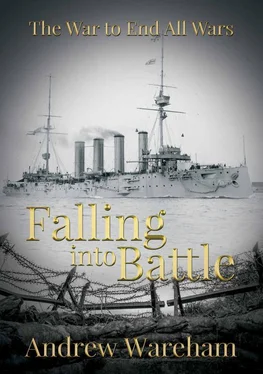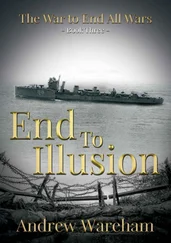Richard had sense enough to murmur his thanks.
“Good show! We are to entrain at four o’clock, changing trains and station in London and are due to reach Dover for oh-two hundred hours. We’ll be late, of course – the railways never run to time! We are then to take an available boat to Calais and will be given a destination there. Now you know as much as I do! All I have to say to you is to do your duty – which I know you will – and show a good face to the men. You are both young, I know, but I see you have made a respectable start to the moustache, Baker. Tradition in the Regiment, of course, as well as King’s Regulations. Do your best, Mr Smithers. D Company Commander, Captain Platt, is waiting for you in his office.”
They dismissed to find Captain Platt, Richard quietly wondering just how Smithers was to ‘do his best’ to grow his moustache. The colonel had a magnificent, bushy set of handlebars, carefully trimmed and rather ginger. Difficult for a young man to match.
Captain Platt was tall and also possessed a heavy growth on his lip – that seemed to be his sole distinction. He was at least thirty – ancient, in the lieutenants’ opinion – and seemed inclined to dither.
“Ah… Yes. Good to meet you both. Do take a seat. Now then… Thing is, bit short of officers, Third Battalion just being formed. Can’t set you to understudy an experienced man. Best thing is for you to keep the Territorials, Baker, and for Smithers to have the half-company from the Second Battalion that forms the cadre. The Territorials will be harder work, of course.”
Richard acknowledged the order – as the senior of the two he had been given the more demanding job, which was useful. Sergeant Grace would do the bulk of the work – he knew his way around the Army.
“Now then, you must see the Adjutant, for pay and such. Get your names on the roster and see to the mess bills. Have you got sidearms? I am told that Terriers do not normally carry them.”
They shook their heads.
“Got to have them on active service. Adjutant will see about them. Deduct them from your pay, of course – an officer must buy his own revolver. That apart, there is the matter of a sword. Regimental pattern. Need it for parades. See the Adjutant. Time for lunch after that. Don’t drink too much – busy afternoon!”
The busy afternoon consisted of telling Sergeant Grace to carry on; collecting the heavy .455 Webley revolver from the Armoury and discovering how to fit it to his belt; tucking a box of ammunition into his own bag and signing all of his pay away to the Adjutant for mess fees. He was carrying twenty pounds in sovereigns - his father having found out that he would need cash in his pocket - and was unconcerned that he would never see his pay. The Navy would have been the same.
Smithers was somewhat upset, his private income amounting to a ten shilling note his headmaster father had found for him.
The adjutant had supplied a batman for Richard, an older man, less useful in a rifle platoon; he would be left behind when they marched out in France but would be necessary for the month or two they expected to spend in base camp at Calais. Smithers would share a man with two other second lieutenants. It seemed reasonable to Richard, who didn’t much like Smithers in any case.
“What about swords, sir?”
The Adjutant shook his head.
“Field equipment only, Baker. The sword will be needed for the ceremonial parades after the war. Put in your order for a blade to our pattern – I can do that for you – and the sword cutlers will have it ready by Christmas, when you need it. Nothing for you to worry about there. Buttons!”
The last cry puzzled Richard.
“You haven’t got Regimental buttons, on your uniforms! What can we do? No time to get to the tailors! I must speak to the colonel.”
The first reaction was that it was impossible for the Territorial officers – there were eight in total – to go to France with the battalion. They would have to wait in the barracks for the tailors to provide them with new uniforms, taking advantage of the delay to correct their cut, which was not quite what the Regiment liked.
“Shoulder badges as well, though the batmen would have been expected to sew them on.”
Richard was not at all displeased to discover that they would not join the spearhead of the BEF after all.
An hour later and they were called back to the colonel.
“Talked to the War Office. Used the telephone! Can’t send the battalion short of officers and we are needed in France – part of the establishment of the BEF. You have to come with us. I have sent a telegram to the tailors and they will meet us in London with buttons and as many of their outworkers as they can round up. They will work on your existing uniforms on the train down to Dover. They will replace buttons on one set of working dress and mess undress, at least. More if possible. Your batmen can do the rest as quickly as is practical. Shocking!”
It was lucky, they were told, that the Adjutant had spotted the problem in time. God alone knew what they could have done if the buttons had not been noticed before they reached France!
“War Office is to blame – they must surely have known this difficulty would arise if they mobilised the Territorials. Not your fault, gentlemen, but they should perhaps have appointed you to lesser Regiments where it would not have mattered so much. We do have standards, you know!”
The train chugged slowly away at four o’clock exactly, the battalion all aboard, and reached St Pancras and the tender care of the tailors at six. There were omnibuses lined up waiting for them and they were taken in convoy across London to Victoria station where they joined a mass of other battalions come in mostly from Salisbury Plain, where the bulk of the Army was to be found in summer.
Trains were loading for Dover at every platform and they waited no more than an hour to embark. Then they sat in their carriages until the lines were clear and they could pull out.
They reached Dover in the August dawn and made up the numbers on the deck of a ferry, packed shoulder to shoulder, grossly overloaded. An escort of destroyers and sloops took them across the Channel, Richard interested to notice that the small ships seemed to have little idea of where they should be, were wandering almost at random. He was glad that there were no submarines in the offing.
They marched off into Calais in mid-morning, finding Military Police ready to guide them out on the roads to the Belgian frontier. There was no base camp, they were to go out immediately in search of the war.
The word came down the line that there was no transport. They were to march. The baggage train would follow after as soon as horses and wagons could be organised.
“What about food, Captain Platt?”
“Jolly good question, Baker! I’ll ask the Major. For the moment – march!”
“Where are we going, sir?”
“Northeast, more or less. Following the road into Belgium, somewhere. The Colonel says we shall receive further orders in the next few days. First of all we must get wherever we are going.”
The flotilla made its way along the Channel, returning to Harwich in line astern behind its leader, Robin, still one of the destroyers although the plan was to bring in a light cruiser for Captain D to command. The cruiser would have space for the necessary staff a functioning leader must have and would carry wireless equipment.
Sheldrake was now sixth in line, second in her half section, reflecting her level of efficiency and her captain’s imminent prospect of promotion from lieutenant-in-command to lieutenant commander and leadership of his own half of a flotilla.
“Robin signalling, sir.”
Читать дальше












